Film Name: 金刚川 / Sacrifice / The Sacrifice
After watching Sacrifice, I was relieved to see that there was no historical nihilism in the film, nothing personal, and no over-emphasis on the so-called “anti-war” modernization; it was just a melodramatic film highlighting the heroism of the volunteer fighters.
Of course, there are many problems with the movie, such as roughness, dragging, watering down, etc., but these problems are more caused by the hasty production, which is predictable and not too disappointing.
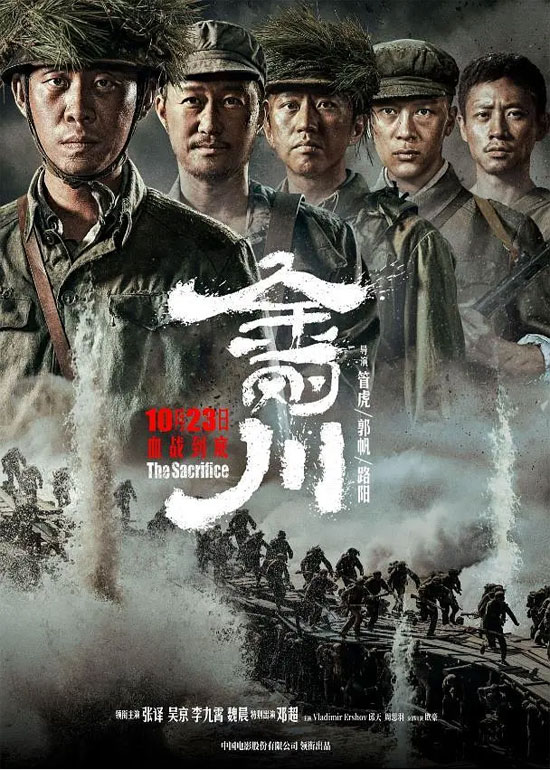
For a movie with such a special mission, the most important thing is to capture the core thematic idea, to show our nation’s temperament, resilience, responsibility and bearing, to console the martyrs and to remember history – in this respect, Sacrifice has done it.
[Friendly reminder: there will be spoilers below].
To say that before the release of the film is not worried about the quality of “Sacrifice” that is certainly false, after all, from the project to shooting to post-production to the publicity and distribution to the theaters, only a few months full of time, such as filming a movie is not more than the marching and fighting, “hype” out of the work is usually not good … … …
The movie made a very smart choice: it did not aim at the front battlefield, but focused on the story of “repairing, protecting and crossing bridges”, which is only a small part of the war against the U.S. and North Korea, the workload is much smaller, and it can be polished with more specialization under the apportionment of the three directors.
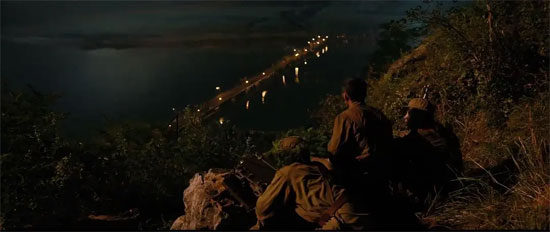
Sacrifice has to pay a price for its trickery, and the “small scenes” mean that the audience will demand more from the playwright, the details, and the character and environment portrayals.
The movie uses three perspectives to tell the same story, which at first glance seems to be quite novel and clever, but the actual effect is not good, the first three chapters of “Soldier”, “Rivals”, and “Artillery Squad” have a lot of repetitive camera depictions, which, although it is said that it is for the purpose of explaining the time nodes clearly, it is still suspected of watering down the story.
If “Dunkirk” is to use three different styles of content to form a story, then “Sacrifice” is like the existence of three partially homogenized perspective of a story told three times (of course, the former belongs to the author of Nolan’s finely crafted film, the latter belongs to the Guan Hu, Guo Fan, Lu Yang and other group of people to rush out of the collaborative film, the two are not suitable to put into a dimension). (of course, the former belongs to Nolan’s author’s movie, and the latter belongs to the collaborative movie made by Guan Hu, Guo Fan, Lu Yang and others.)
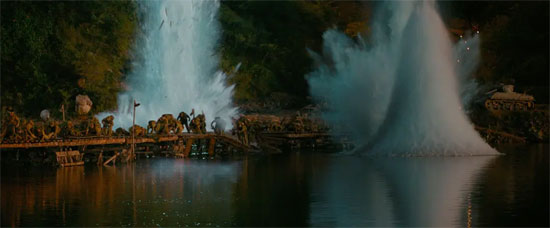
At the same time, the first chapter of Soldier also seems to be loose and dragging, although it unfolds a group portrait of soldiers, and although the unintelligible Nanchang dialect of Jiangxi cousin Gao Lianchang (Deng Chao) and Sichuan child Liu Hao’s (Li Jiuxiao) “mamma-mai-pai” are very friendly to the ear, the pace is really too slow and scattered… …
In fact, if the first three chapters and the final chapter of “The Bridge” were edited in straight cuts, with some of the repetitive footage and marginal writing removed, and the length reduced, the result would probably be better than the current version.
In short, from a purely commercial war movie point of view, Sacrifice is a bit of a mess, and the viewing experience is not ideal, but that doesn’t detract from its own merits.
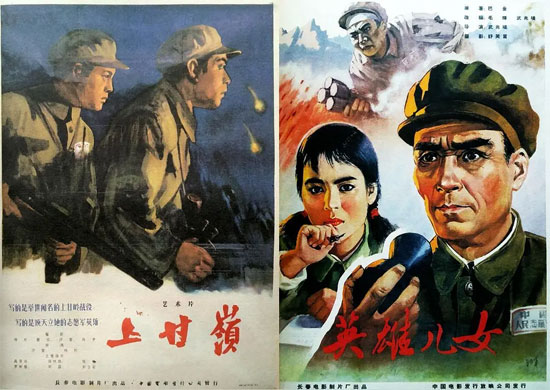
A few days before the release of the film, I deliberately back to watch the “Battle of Shangganling” and “Heroic Sons and Daughters”, the two relatively most well-known Korean War theme of the old film, of which “Battle of Shangganling” makes me really feel “unity tension, serious and lively” temperament, while “Heroic Sons and Daughters” intention is very subtle, the episode song “Heroic Hymn” has been covered as “Sacrifice”, which is also covered as “Sacrifice”. Battle of Shangganling” gave me a real sense of ‘unity and tension, seriousness and liveliness’, while ‘Heroic Sons and Daughters’ was so well thought out that its interlude ‘Hymn to the Heroes’ was covered as the theme song of ‘Sacrifice’.
I’ve often wondered what could be improved in today’s movies, other than the technical aspects, compared to the melodramas of the past. (Some of the things that were lost probably won’t be recovered…)
In the case of Sacrifice, the most notable aspect is the portrayal of the enemy. In fact, there aren’t many war movies that devote space and effort to portraying the enemy, and even fewer domestic war movies, so the character of Hill, the American pilot, is a rarity.
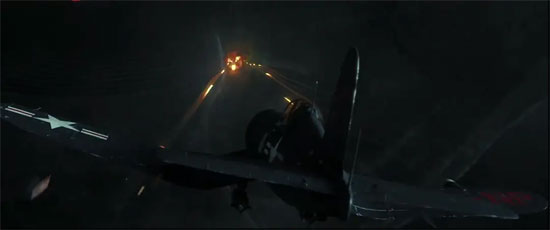
Some people found the design of the second chapter, “The Rivals,” to be unorthodox, which is understandable, and for me personally, Hill’s character was able to stand up: a very richly drawn image of an American, reciting poetry while flying a fighter jet, seemingly literate while at the same time full of arrogance and prejudice, and driven by a sense of triumphalism and risk-taking, who returns to attack time and time again and becomes the volunteer fighters’ most dreaded enemy.
Due to subjective and objective factors, the image of the enemy in domestic movies has been relatively thin, and in today’s increasingly aesthetic audience, purely evil or stupid enemies are no longer enough to look at, as in the “anti-Japanese dramas”, the image of ghosts is tantamount to a disguised degradation of the revolutionary forefathers. ……
Sacrifice” in the Hill, good is good in bypassing his definition of war, but highlights his competitive and cowboy style, he does not believe that the group of ‘with two branches to eat the savage’ has not been defeated by their own, and even have the ability to counterattack, in order to self-esteem, he must be with those who can not see the face of the opponents to fight out! For the sake of self-esteem, he must fight with those opponents whose faces he could not see to determine whether they would win or lose – neither one-sidedly vilifying the enemy nor wrongly glorifying the enemy, and such opponents are more able to bring out the heroism of the volunteer fighters.
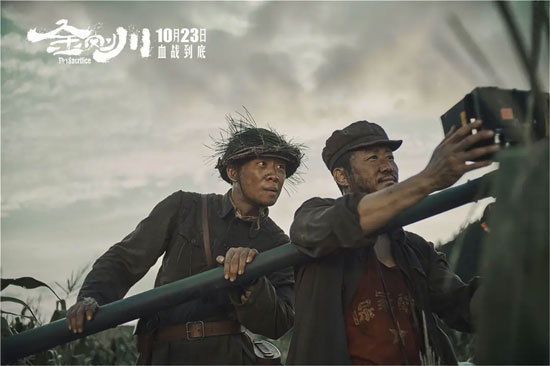
The real firefight between the two sides in the whole movie only takes place between two anti-aircraft guns and a few airplanes, and to refine it a bit, it takes place between Hill and the anti-aircraft gun squad, and the fullest characters in Sacrifice are Zhang Fei (Zhang Yi) and Guan Lei (Wu Jing), who are also in the anti-aircraft gun squad.
Although there is not much ink, we can appreciate the deep comradeship between the two men who care for each other. They clamor for command, fight over who will go to the No. 1 gun position that exposes the location, but in fact, they are all trying to put themselves in a more dangerous place, and with only a few words, as well as some details such as artillery shells and tobacco, this friendship jumps off the page and becomes convincing.
When Guan Lei realized that the returning fighters “are coming at us”, he decisively increased the provocation, even if the shells are exhausted, but also insisted on shooting to attract each other, and completely turned the firefight into a “personal grudge” type of battle.
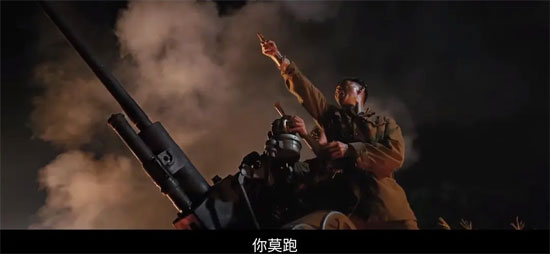
Later, the originally calm and conservative Zhang Fei inherited Guan Lei’s aggressive and desperate style.
The tragic experience of losing a comrade (not even a whole body) is indeed the best reason for people to be impulsive and turn the battle into a personal vendetta, but was Zhang Fei’s behavior only motivated by personal vendetta? Obviously not.
The task of the anti-aircraft gun squad is to assist the engineer company Ansheng repair bridge, meet the enemy, cover their comrades is their highest mission, in the enemy aircraft attack, they attracted more fire, dumped in the comrades on the ammunition will be one point less, no matter how many rounds of artillery, no matter how many blows can be inflicted on the enemy, the anti-aircraft gun squad itself is a barrier erected between the enemy and their comrades, this barrier is made of steel and flesh and blood. This barrier is made of steel and flesh and blood.
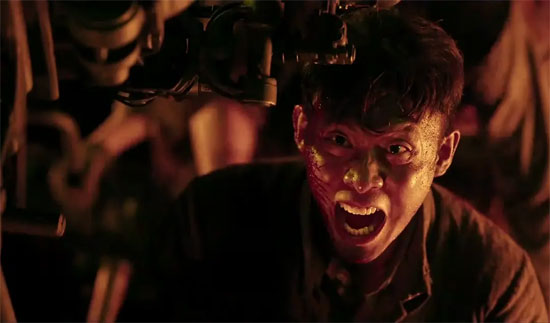
It’s worth mentioning that no matter what kind of evaluation is given to Sacrifice, the audience who have seen this movie almost all give their affirmation to Zhang Yi’s performance, which shows that this good actor and this good role have realized mutual achievement in the movie.
In addition, I think what is more important is that Sacrifice grasps one of the most crucial atmospheres, that is, the unspeakable difficulty, and under the repeated bombardment of the movie, one has to sigh: it’s hard, it’s really too hard.
It’s a completely unequal battle, where a few airplanes can overwhelm thousands of people, and where volunteer fighters only have eyes in two directions, the one ahead of them that’s advancing, and the one in the sky that will bring danger.
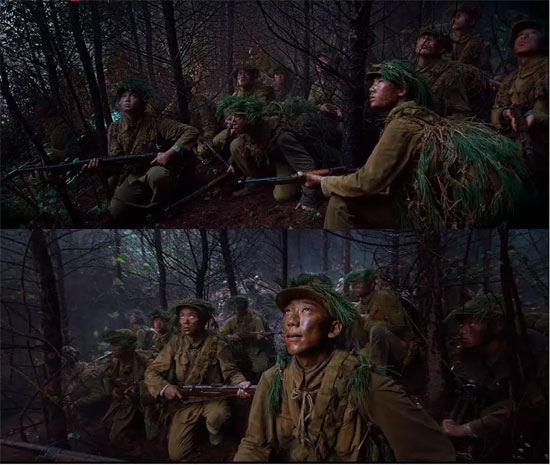
At that time, the material scarcity of the new China, extremely limited aircraft tanks and other heavy weapons to be put into a more tightly frontal battle, on the quality of equipment, and the most advanced and powerful U.S. Army is more than the generation difference in distance, even if the enemy can cause an effective blow to the Katyusha rockets as well as anti-aircraft artillery, but also from the Soviet Union’s support …….
But even so, those pimply-faced lads of the pair of eyes, but still all clear and bright, gleaming God.
War is a competition of weapons and equipment, but also between people, in the “Sacrifice” so difficult environment, in the bombs and incendiary bombs successive heavy damage, volunteer soldiers still set up a human bridge, so that the troops across the river to the front of the battlefield.

In the words of our opponents, “Although you don’t believe in God, you do create miracles.”
Of course, we should understand that there is no such thing as a “miracle” in the world, but ordinary people who have created extraordinary historical achievements with their will and blood. …… Sacrifice is indeed a movie with many problems, but as long as it makes people feel a trace of such a spirit, then its value should be recognized. As long as one feels a hint of such spirit, then its value should be recognized.
Why is the battle flag so picturesque that the
The blood of heroes dyed it red
Why is spring always on the earth?
Heroes’ lives blossom

After the movie last night, a kid in the back row asked, “So did we win the fight?”
The mom replied, “Where would you be now if you hadn’t won.”
……
I hope there will be more and better films and TV works on the theme of anti-US and anti-North Korea in the future. New China’s “founding battle” is still seriously underestimated, and there is a need for more fresh blood to fill up our slightly dry memories, that generation of people has exchanged dedication and sacrifices for the peace and development of several generations, so please remember those loveliest people.
Please specify:Anime Phone Cases » Sacrifice 2020 Film Review: Remembering those who are the loveliest